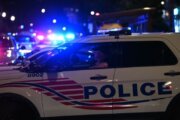DIAA HADID
Associated Press
DAMASCUS, Syria (AP) — With security heightened in Damascus and thousands fearing rebel attacks in other cities, Syria holds an election Tuesday in the middle of its bloody civil war — a vote that President Bashar Assad is expected to win easily and that critics have denounced as a sham.
Assad’s re-election to another seven-year term would show the tenacity of a ruler who had only a tenuous grip on power just over a year ago. In the past 12 months, his troops have clawed back to regain lost ground and significantly strengthen his position, giving him little reason to seek a political compromise in a conflict that has killed more than 160,000 people.
Still, the Syrian government has gone to great lengths to present the vote as a way to resolve the crisis and move forward. For the first time in more than 50 years, more than one candidate will be on the ballot. Assad faces two government-approved challengers in the race, Maher Hajjar and Hassan al-Nouri, both of whom were little known in Syria before declaring their candidacy in April.
The Syrian opposition and its Western allies have dismissed the vote as a farce, questioning the credibility of an election taking place during a raging civil war. Much of northern and eastern Syria is in rebel hands, and polling will only be done in government-controlled areas.
Ahmad al-Jarba, the leader of the Western-backed Syrian National Coalition, described the vote as “theater written with the blood of Syrians.” He urged his countrymen to stay home, alleging that Assad was planning to bomb and shell voting centers in order to blame the opposition.
Campaigning officially ended Monday, and workers across central Damascus took down banners, posters and pictures of the candidates. Blue and yellow tents were set up to shade the crowds expected at polling stations from the sun.
Hajjar and al-Nouri gave several interviews and turned up at election events during the race, but Assad has not made any public appearances in recent weeks. Still, the president remained a ubiquitous presence.
A gigantic banner with a smiling Assad stretched from the upper stories of a Damascus university building proclaiming, “The students are with you.” Another banner, spangled with tiny Syrian flags, hung from a government ministry and proclaimed its support for the president.
Motorists taped images of Assad on their windows, and posters of him in sunglasses and a military uniform, his sleeves rolled up, were stuck to military checkpoints.
Prime Minister Wael al-Halqi urged Syrians to cast their ballots for a president “who would lead the next stage, achieve security and stability in the country, and bolster unity and national principle for the Syrian people and step up the achievement of national reconciliation.”
He said the election was a “historic day” for Syria and that a large turnout will “prove to the entire world that the Syrian people have decided and are determined to make the electoral process a success.”
Tens of thousands of Syrians abroad voted last week, although many of the more than 2.7 million Syrian refugees across the region either abstained or were excluded by voting laws.
Inside Syria, attitudes toward the polls appeared to be a mix of apathy and anger.
Haya, a 23-year-old civil engineering student from Homs, said she is under no illusion the vote is truly fair, but said she still will vote for Assad.
“If he stays in power, we have hope of getting our lives back, the peace and the stability,” she said, speaking on condition she only give her first name because of security reasons.
“What’s the alternative?” she asked. “Letting this violence continue and being at the mercy of jihadists? Whether you personally like Assad or hate him, you have to admit that the opposition did not give us anyone to rally behind, someone who is not a traitor, who would protect minorities and have weight on the ground.”
Mohammed, a 37-year-old businessman from Damascus who has lived in Beirut for the past three years, said he will not return to vote. He also refused to give his full name because he feared for his safety.
Rebels in some parts of the country have threatened to disrupt the voting in government-held areas. Thousands of people already have fled the northwestern city of Idlib fearing attacks. Over the weekend, rebels appeared to ramp up their shelling in the northern city of Aleppo.
The Britain-based Syrian Observatory for Human Rights said 50 people have been killed in the Aleppo attacks since Saturday. Syrian Information Minister Omran al-Zoubi said 20 people were killed and 80 wounded “within 10 minutes” on Saturday alone.
Aleppo, Syria’s largest city and once its commercial center, has been carved into rebel- and government-controlled areas since opposition fighters launched an offensive in mid-2012. Voting will be held in government areas, but not in opposition districts.
The Interior Ministry said there were 15.8 million eligible voters, both inside and outside Syria. It added that 9,600 voting centers have been set up around the country.
Polling stations are scheduled to open on Tuesday at 7 a.m. (0400 GMT, midnight EDT Monday) and close 12 hours later. The ministry said voting could be extended for five hours if there is a big turnout.
Syria’s two main internal opposition groups describe the election as “illegitimate,” and are boycotting.
In predominantly Kurdish areas in northeastern Syria, polling stations will be open, although Kurdish parties have said they will boycott. The only major city where there will be no vote is Raqqa, which is controlled by the al-Qaida-breakaway Islamic State of Iraq and the Levant.
___
Associated Press writers Bassem Mroue, Yasmine Saker and Ryan Lucas in Beirut contributed to this report.
Copyright 2014 The Associated Press. All rights reserved. This material may not be published, broadcast, rewritten or redistributed.







